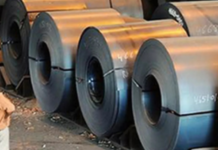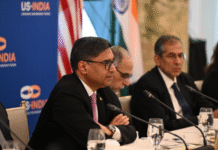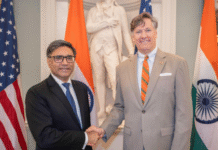New Delhi– Prime Minister Narendra Modi on Tuesday called upon the US companies to fully avail of business opportunities in India in new areas such as energy, health care, digital technology besides start-ups.
He was addressing board members of United States India Strategic Partnership Forum (USISPF) who called on him. The board members include senior industry and business captains of the United States.
They briefed Modi on the outcomes of India Leadership Summit held earlier in the day.
An official release said the business leaders appreciated the economic and regulatory reforms implemented by the government in the past four years and expressed their desire to further deepen their engagements with India to make use of the mutually beneficial opportunities created by the rapidly growing Indian economy.
Modi said that both countries have benefited in an unprecedented manner through economic engagement.
“He encouraged US companies to fully avail of the business opportunities in new areas as well, such as start-ups, energy, health care and digital technology,” the release said.
A release issued by the Forum said that the theme of this year’s Summit was ‘In Pursuit of Inclusive Prosperity,’ showcasing the contributions of both countries to inclusive growth.
It said that USISPF board members, Jim Umpleby, CEO of Caterpillar and John T. Chambers, Chairman Emeritus of Cisco and Founder & CEO of JC2 Ventures presented a study: “Inclusive Prosperity: The Story of American Business in India”, to Finance Minister Arun Jaitley.
According to its findings, US companies contributed over $ 90 billion to India’s GDP (2017) as over 6.6 million jobs are supported by US companies in India (2018). The US is India’s largest trading partner and top export market. It is also India’s top source of FDI with $50 billion worth of flows between 2014 and first quarter of 2018.
The study also said US companies invested over $ 5.5 billion in R&D in India (2016) and the US companies contributed to over five per cent of total CSR expenditure in India (2017). (IANS)







